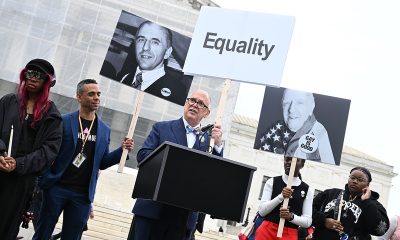a&e features
‘Define yourself’ — Ariadne Getty on family, philanthropy and queer activism
‘I encourage everybody who has any way of being part of a cause to make the time and become involved’
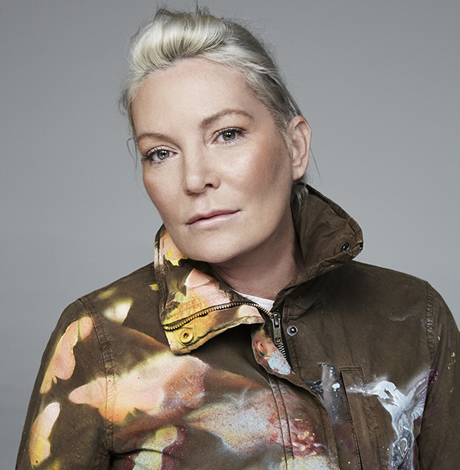
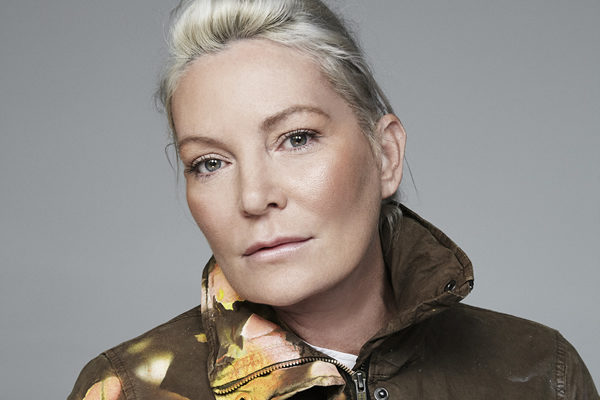
“Money is like manure,” said J. Paul Getty. “You have to spread it around or it smells.” Getty himself was redolent of a rascally sort of rapaciousness. He was also a tough old coot with a tumescent appetite for beautiful women. But he had a soft spot for one particular beauty in his life: his granddaughter and godchild, Ariadne Getty, now 57, who has always been a bit of a rascal herself — one part punk, one part princess.
“I’ve never taken any of this for granted,” the philanthropist tells me when she is read that quote from her grandfather. “I’ve never pretended that I made a penny in my life. I inherited this money and I’m a steward. I have to honor it. Actually, I have to honor my great-grandmother who set up the trust. She didn’t trust my grandfather because he was a womanizer,” she says, confirming this lede paragraph and letting loose a signature burst of laughter, a quick gale of it that can blow through a conversation like a gust of gumption.
Such frankness is refreshing as she sits at a table in her Los Angeles home on this conference call as we converse in the disembodied way that such calls engender on top of the already stilted badinage of an interview’s back-and-forth, a kind of disembodied, distilled discourse all its own with which such wealthy patrons raised by the wolves of fame and fortune engage journalists after having been coached to do so by the experts they hire to smooth their heralded heredity into but a smattering of personality quirks and wisecracks. Call it the knowingness of the known.
Getty has an expert publicist and the expert head of her charitable foundation there at the table with her at each of her elbows, which I imagine to be well-lotioned, even though she is unafraid to throw such elbows around a bit roughly if need be in the staid world of philanthropy. That is her charm: her ability, elbows ready, to challenge others to find their inner iconoclast even as they serve a higher purpose to better society as a whole. Yet there is nothing slippery about this iconoclastic woman even if the emollients of lotion and lavish privilege come to mind when speaking with her.
Indeed, Ariadne Getty speaks haltingly — a bit shyly — and chooses her words quite carefully. This is not out of a fear of being misquoted so much as it is out of the seriousness with which she takes her philanthropic impulse.
When she was first starting her charitable foundation, she came up with a one-line, two-word mission statement: “Unpopular Causes.” It has since expanded to the more generalized assertion that the goal of the Ariadne Getty Foundation is to “work with partners worldwide to improve the lives of individuals and communities through large-scale investments & hands-on advocacy.”
The focus most recently at the foundation has been shoring up LGBTQ organizations, such as the Los Angeles LGBT Center and GLAAD. Getty joined the board of directors of the latter in 2016 and last year at the World Economic Forum in Davos she pledged $15 million to the organization, which focuses on media and how we as a culture can rewrite the script for LGBTQ acceptance.
I ask her if maybe her daughter Nats Getty’s mission statement for her gender-fluid streetwear line, Strike Oil, might be an even better fit for her foundation. It reads, in part: “For the misfits and the outcasts, The unseen and the unheard, For anyone who dares to be different, Because different is dope.”
She readily agrees and tells me that Nats and her brother August, also a fashion designer but one with a more high-end couture aesthetic focused on the female client, are her “beacons of information and light.” They are her only two children. August is gay. Nats is a lesbian and married to Gigi Gorgeous, the YouTube sensation and transgender activist. They are the kind of adults who still have a cool-kid vibe about them, as does their part punk/part princess mom. They are quite a triple-treat as a close-knit family as well as a style council of creative spirits who straddle lots of worlds — Getty runs both the fashion lines — and I’d wager some of that Getty wealth that when you use the term “grommet” around them they know it is not only something that can reinforce an eyelet sewn into a piece of clothing, but also a term for an inexperienced skateboarder with scratched-up knees and no real scratch of his own.
“Inexperienced” is not a term anyone would use for Ariadne Getty who grew up outside Siena, Italy, with her mother after her parents divorced. It was in many ways an idyllic setting for a childhood but anywhere would have been within reach of the tentacles of the family scandals that, as she grew up and realized what her last name meant to the larger world, strengthened her even as it all made her a bit wary — and, yes, for a time quite weary — of public attention. Her father J. Paul Getty II was a drug addict for much of his life (her stepmother died of a heroin overdose) and became a recluse in England in his later years, but one finally with a generous spirit which she seems to have inherited from him. She survived the actual narrative of the kidnapping of her older brother, J. Paul Getty III, and his subsequent heartbreaking health issues as well as the faux narratives made more noxious for their rather mercenary and monetary reasons.
She bonded with her sister Aileen who is herself an activist and philanthropist, roles that were motivated by Aileen’s HIV-positive status. She lived in London and had a swinging time designing T-shirts and being a bit of dilettante who dallied in lots of sybaritic endeavors. She even had an academic interregnum at Bennington College in Vermont.
Getty’s gust of laughter again blows through the conversation when I bring up her college days because of how few those days actually were.
So she didn’t go for the whole four years?
“I certainly did not.”
Does she even remember her time at Bennington or was it basically one long, however brief, blackout?
“It’s a little bit fuzzy to be honest,” she confesses. “But I did learn a lot there. I really did. I had some fantastic people I was exposed to. It really was an environment that allows you to find your own personality without the restrictions of rules. It’s almost like a Waldorf approach to college,” she tells me, citing the Rudolf Steiner holistic model of education. But I take it as another kind of cue. “A Waldorf salad approach?” I ask. Another gust of of laughter. “It does put nuts into your life,” she says.
Some would claim that her children and their circle of friends — many of them the misfits and outcasts cited in Nats’s mission statement for Strike Oil streetwear — are the latest nuts in her life with whom she has surrounded herself. She is a kind of den mother of the denizen of acceptance that her home has become for this extended LA family. They even call her Mama G. Does she think she would be so viscerally focused on LGBTQ rights if she weren’t the mother of two gay children and seen as a mother figure for so many of their friends? There is a maternal aspect to her activism. “I always say I am here doing this mostly to support what my children have made me aware of … I’m not sure how the Mama G thing started, but it’s so sweet. I get texts to Mama G all the time from the friends of my children and my daughter-in-law Gigi. I am a fiercely loyal mother. I will go to war for my children and their friends.”
“You’re like a polar bear,” I tell her.
“I can’t believe you said that. That’s my spirit animal. You got me there. They are my cubs — Nats and August. And all of their friends are, too.”
“Yet not all wealthy parents support their gay children in the way that you have chosen to support yours. Some of them even donate to Donald Trump. Would you meet with Trump if he invited you to the White House?”
“Oh, Kevin … Kevin …,” she says, moaning. No laughter is launched into the conversation at the thought of this. There is a long silence instead. “I would have to say, ‘I’m sorry. Under most other situations, I would be honored to be invited and I would love to go,’” she carefully begins. “But as Trump continues to stop people’s human rights and disregards the basic … ah … ah, ” she stops again. Time to throw some elbows, after all. “You know what, I would tell him in a heartbeat that under any other circumstances I would love to go but I actually wouldn’t know what to do with myself if I met with him in the Oval Office. I would probably even have a couple of rotten tomatoes in my pocket,” she says, that gust of laughter finally unleashed as she references her time in England and how the groundlings there would respond to their own vulgarians on their Elizabethan stages by throwing such weaponized fruit at them.
“You could bring your children and daughter-in-law to bear visual witness to your meeting with him,” I suggest, knowing that Gigi is sort of Trump’s type and how disconcerting that would be for him to be turned on by her.
“If he allowed me even to bring them with me,” says Getty. “Can you imagine? Or we could wear MAGA caps but install little mini-cams in them and tape his reaction when I introduced him to my daughter-in-law, ‘Mr. President, this is Gigi. She’s transgender.’”
We have been speaking on this conference call the same day that Ellen DeGeneres was getting media flak for her friendship with another president, George W. Bush. What does Ariadne think of Ellen’s response to the criticism?
“I personally believe that if you have a platform no matter what it is — even if it is your single voice as a human — you have a responsibility to it. Ellen is extremely fortunate to have such a fan base and a platform. I personally believe that there is nothing wrong with being friendly in private, but going public with it and saying what she said sends a mixed message. It not only might confuse her fans but also those who aren’t necessarily her fans but use her as a sort of barometer. Since she is a comedian, she gets to tackle a lot of topics. I do think that this is a message that does not need to be so public. Yes, it’s important to respect and accept everyone for who they are. I haven’t read exactly what she said. But if she is using her platform but she is ignoring the facts that there were so many rollbacks with Bush and his administration and there were so many LGBTQ injustices passed, then I don’t agree with that.
“She is not referencing that. She is not saying even though these things happened, we can affect a change if we approach those who have been against us in a fair and kind way in order to try and find a middle ground … After the election in 2016, I called Sarah Kate Ellis, the president and CEO at GLAAD. I said I’m going to bed and closing my curtain and I’m going to stay here for a couple of weeks because I’m so very depressed. And she said, ‘I’m going to give you 24 hours to be depressed and then I want you to get out of bed, get dressed, brush your hair, and make 10 calls to talk about the changes you want to see happen. Get up and stand up and get to work.’ And that’s what I did.”
“Here is another quote from your grandfather,” I say, winding down our conference call. “’The rich are not born skeptical or cynical,’” he said. “They are made that way by events and circumstances.’And yet you, Ariadne, have had the opposite reactions to the events and circumstances of your life. They have made you less cynical and skeptical. They have given you a social conscience and spurred you to activism.”
The laughter is no longer a gust of gumption. It is now more a lovely little breeze, a hum of humility underlying it here on the line.
“You know what, life is too short,” she says. “I’ve had all the things happen to me that you can imagine — especially people taking advantage. There could be plenty of space in my life to just shut down and not interact and just basically be a victim, or what have you. But I love my life. It is really a privilege to be involved with the LGBT Center in LA, which has so many intergenerational programs there. I’m fortunate. I encourage everybody who has any way of being part of a cause to make the time and become involved.” She pauses. The breeze erupts into one last gust that carries more than itself forward. “Don’t let what other people do define you,” says Getty. “Define yourself.”
(Editor’s note: Ariadne Getty is being honored with the Washington Blade Lifetime Achievement Award for LGBTQ Advocacy for her commitment to equality. The award is being presented to her at the Blade’s 50th anniversary gala on Oct. 18 in D.C.)
a&e features
Visit Cambridge, a ‘beautiful secret’ on Maryland’s Eastern Shore
New organization promotes town’s welcoming vibe, LGBTQ inclusion

CAMBRIDGE, Md. — Driving through this scenic, historic town on Maryland’s Eastern Shore, you’ll be charmed by streets lined with unique shops, restaurants, and beautifully restored Victorian homes. You’ll also be struck by the number of LGBTQ Pride flags flying throughout the town.
The flags are a reassuring signal that everyone is welcome here, despite the town’s location in ruby red Dorchester County, which voted for Donald Trump over Kamala Harris by a lopsided margin. But don’t let that deter you from visiting. A new organization, Proudly Cambridge, is holding its debut Pride event this weekend, touting the town’s welcoming, inclusive culture.
“We stumbled on a beautiful secret and we wanted to help get the word out,” said James Lumalcuri of the effort to create Proudly Cambridge.
The organization celebrates diversity, enhances public spaces, and seeks to uplift all that Cambridge has to share, according to its mission statement, under the tagline “You Belong Here.”
The group has so far held informal movie nights and a picnic and garden party; the launch party is June 28 at the Cambridge Yacht Club, which will feature a Pride celebration and tea dance. The event’s 75 tickets sold out quickly and proceeds benefit DoCo Pride.
“Tickets went faster than we imagined and we’re bummed we can’t welcome everyone who wanted to come,” Lumalcuri said, adding that organizers plan to make “Cheers on the Choptank” an annual event with added capacity next year.
One of the group’s first projects was to distribute free Pride flags to anyone who requested one and the result is a visually striking display of a large number of flags flying all over town. Up next: Proudly Cambridge plans to roll out a program offering affirming businesses rainbow crab stickers to show their inclusiveness and LGBTQ support. The group also wants to engage with potential visitors and homebuyers.
“We want to spread the word outside of Cambridge — in D.C. and Baltimore — who don’t know about Cambridge,” Lumalcuri said. “We want them to come and know we are a safe haven. You can exist here and feel comfortable and supported by neighbors in a way that we didn’t anticipate when we moved here.”

Lumalcuri, 53, a federal government employee, and his husband, Lou Cardenas, 62, a Realtor, purchased a Victorian house in Cambridge in 2021 and embarked on an extensive renovation. The couple also owns a home in Adams Morgan in D.C.
“We saw the opportunity here and wanted to share it with others,” Cardenas said. “There’s lots of housing inventory in the $300-400,000 range … we’re not here to gentrify people out of town because a lot of these homes are just empty and need to be fixed up and we’re happy to be a part of that.”
Lumalcuri was talking with friends one Sunday last year at the gazebo (affectionately known as the “gayzebo” by locals) at the Yacht Club and the idea for Proudly Cambridge was born. The founding board members are Lumalcuri, Corey van Vlymen, Brian Orjuela, Lauren Mross, and Caleb Holland. The group is currently working toward forming a 501(c)3.
“We need visibility and support for those who need it,” Mross said. “We started making lists of what we wanted to do and the five of us ran with it. We started meeting weekly and solidified what we wanted to do.”
Mross, 50, a brand strategist and web designer, moved to Cambridge from Atlanta with her wife three years ago. They knew they wanted to be near the water and farther north and began researching their options when they discovered Cambridge.
“I had not heard of Cambridge but the location seemed perfect,” she said. “I pointed on a map and said this is where we’re going to move.”
The couple packed up, bought a camper trailer and parked it in different campsites but kept coming back to Cambridge.
“I didn’t know how right it was until we moved here,” she said. “It’s the most welcoming place … there’s an energy vortex here – how did so many cool, progressive people end up in one place?”
Corey van Vlymen and his husband live in D.C. and were looking for a second home. They considered Lost River, W.Va., but decided they preferred to be on the water.
“We looked at a map on both sides of the bay and came to Cambridge on a Saturday and bought a house that day,” said van Vlymen, 39, a senior scientist at Booz Allen Hamilton. They’ve owned in Cambridge for two years.
They were drawn to Cambridge due to its location on the water, the affordable housing inventory, and its proximity to D.C.; it’s about an hour and 20 minutes away.
Now, through the work of Proudly Cambridge, they hope to highlight the town’s many attributes to residents and visitors alike.
“Something we all agree on is there’s a perception problem for Cambridge and a lack of awareness,” van Vlymen said. “If you tell someone you’re going to Cambridge, chances are they think, ‘England or Massachusetts?’”
He cited the affordability and the opportunity to save older, historic homes as a big draw for buyers.
“It’s all about celebrating all the things that make Cambridge great,” Mross added. “Our monthly social events are joyful and celebratory.” A recent game night drew about 70 people.
She noted that the goal is not to gentrify the town and push longtime residents out, but to uplift all the people who are already there while welcoming new visitors and future residents.
They also noted that Proudly Cambridge does not seek to supplant existing Pride-focused organizations. Dorchester County Pride organizes countywide Pride events and Delmarva Pride was held in nearby Easton two weeks ago.
“We celebrate all diversity but are gay powered and gay led,” Mross noted.
To learn more about Proudly Cambridge, visit the group on Facebook and Instagram.
What to see and do
Cambridge, located 13 miles up the Choptank River from the Chesapeake Bay, has a population of roughly 15,000. It was settled in 1684 and named for the English university town in 1686. It is home to the Harriet Tubman Museum, mural, and monument. Its proximity to the Blackwater National Wildlife Refuge makes it a popular stop for birders, drawn to more than 27,000 acres of marshland dubbed “the Everglades of the north.”
The refuge is walkable, bikeable, and driveable, making it an accessible attraction for all. There are kayaking and biking tours through Blackwater Adventures (blackwateradventuresmd.com).
Back in town, take a stroll along the water and through historic downtown and admire the architecture. Take in the striking Harriet Tubman mural (424 Race St.). Shop in the many local boutiques, and don’t miss the gay-owned Shorelife Home and Gifts (421 Race St.), filled with stylish coastal décor items.
Stop for breakfast or lunch at Black Water Bakery (429 Race St.), which offers a full compliment of coffee drinks along with a build-your-own mimosa bar and a full menu of creative cocktails.
The Cambridge Yacht Club (1 Mill St.) is always bustling but you need to be a member to get in. Snapper’s on the water is temporarily closed for renovations. RaR Brewing (rarbrewing.com) is popular for craft beers served in an 80-year-old former pool hall and bowling alley. The menu offers burgers, wings, and other bar fare.
For dinner or wine, don’t miss the fantastic Vintage 414 (414 Race St.), which offers lunch, dinner, wine tasting events, specialty foods, and a large selection of wines. The homemade cheddar crackers, inventive flatbreads, and creative desserts (citrus olive oil cake, carrot cake trifle) were a hit on a recent visit.
Also nearby is Ava’s (305 High St.), a regional chain offering outstanding Italian dishes, pizzas, and more.
For something off the beaten path, visit Emily’s Produce (22143 Church Creek Rd.) for its nursery, produce, and prepared meals.
“Ten minutes into the sticks there’s a place called Emily’s Produce, where you can pay $5 and walk through a field and pick sunflowers, blueberries, you can feed the goats … and they have great food,” van Vlymen said.
As for accommodations, there’s the Hyatt Regency Chesapeake Bay (100 Heron Blvd. at Route 50), a resort complex with golf course, spa, and marina. Otherwise, check out Airbnb and VRBO for short-term rentals closer to downtown.
Its proximity to D.C. and Baltimore makes Cambridge an ideal weekend getaway. The large LGBTQ population is welcoming and they are happy to talk up their town and show you around.
“There’s a closeness among the neighbors that I wasn’t feeling in D.C.,” Lumalcuri said. “We look after each other.”
a&e features
James Baldwin bio shows how much of his life is revealed in his work
‘A Love Story’ is first major book on acclaimed author’s life in 30 years

‘Baldwin: A Love Story’
By Nicholas Boggs
c.2025, FSG
$35/704 pages
“Baldwin: A Love Story” is a sympathetic biography, the first major one in 30 years, of acclaimed Black gay writer James Baldwin. Drawing on Baldwin’s fiction, essays, and letters, Nicolas Boggs, a white writer who rediscovered and co-edited a new edition of a long-lost Baldwin book, explores Baldwin’s life and work through focusing on his lovers, mentors, and inspirations.
The book begins with a quick look at Baldwin’s childhood in Harlem, and his difficult relationship with his religious, angry stepfather. Baldwin’s experience with Orilla Miller, a white teacher who encouraged the boy’s writing and took him to plays and movies, even against his father’s wishes, helped shape his life and tempered his feelings toward white people. When Baldwin later joined a church and became a child preacher, though, he felt conflicted between academic success and religious demands, even denouncing Miller at one point. In a fascinating late essay, Baldwin also described his teenage sexual relationship with a mobster, who showed him off in public.
Baldwin’s romantic life was complicated, as he preferred men who were not outwardly gay. Indeed, many would marry women and have children while also involved with Baldwin. Still, they would often remain friends and enabled Baldwin’s work. Lucien Happersberger, who met Baldwin while both were living in Paris, sent him to a Swiss village, where he wrote his first novel, “Go Tell It on the Mountain,” as well as an essay, “Stranger in the Village,” about the oddness of being the first Black person many villagers had ever seen. Baldwin met Turkish actor Engin Cezzar in New York at the Actors’ Studio; Baldwin later spent time in Istanbul with Cezzar and his wife, finishing “Another Country” and directing a controversial play about Turkish prisoners that depicted sexuality and gender.
Baldwin collaborated with French artist Yoran Cazac on a children’s book, which later vanished. Boggs writes of his excitement about coming across this book while a student at Yale and how he later interviewed Cazac and his wife while also republishing the book. Baldwin also had many tumultuous sexual relationships with young men whom he tried to mentor and shape, most of which led to drama and despair.
The book carefully examines Baldwin’s development as a writer. “Go Tell It on the Mountain” draws heavily on his early life, giving subtle signs of the main character John’s sexuality, while “Giovanni’s Room” bravely and openly shows a homosexual relationship, highly controversial at the time. “If Beale Street Could Talk” features a woman as its main character and narrator, the first time Baldwin wrote fully through a woman’s perspective. His essays feel deeply personal, even if they do not reveal everything; Lucian is the unnamed visiting friend in one who the police briefly detained along with Baldwin. He found New York too distracting to write, spending his time there with friends and family or on business. He was close friends with modernist painter Beauford Delaney, also gay, who helped Baldwin see that a Black man could thrive as an artist. Delaney would later move to France, staying near Baldwin’s home.
An epilogue has Boggs writing about encountering Baldwin’s work as one of the few white students in a majority-Black school. It helpfully reminds us that Baldwin connects to all who feel different, no matter their race, sexuality, gender, or class. A well-written, easy-flowing biography, with many excerpts from Baldwin’s writing, it shows how much of his life is revealed in his work. Let’s hope it encourages reading the work, either again or for the first time.
a&e features
Looking back at 50 years of Pride in D.C
Washington Blade’s unique archives chronicle highs, lows of our movement
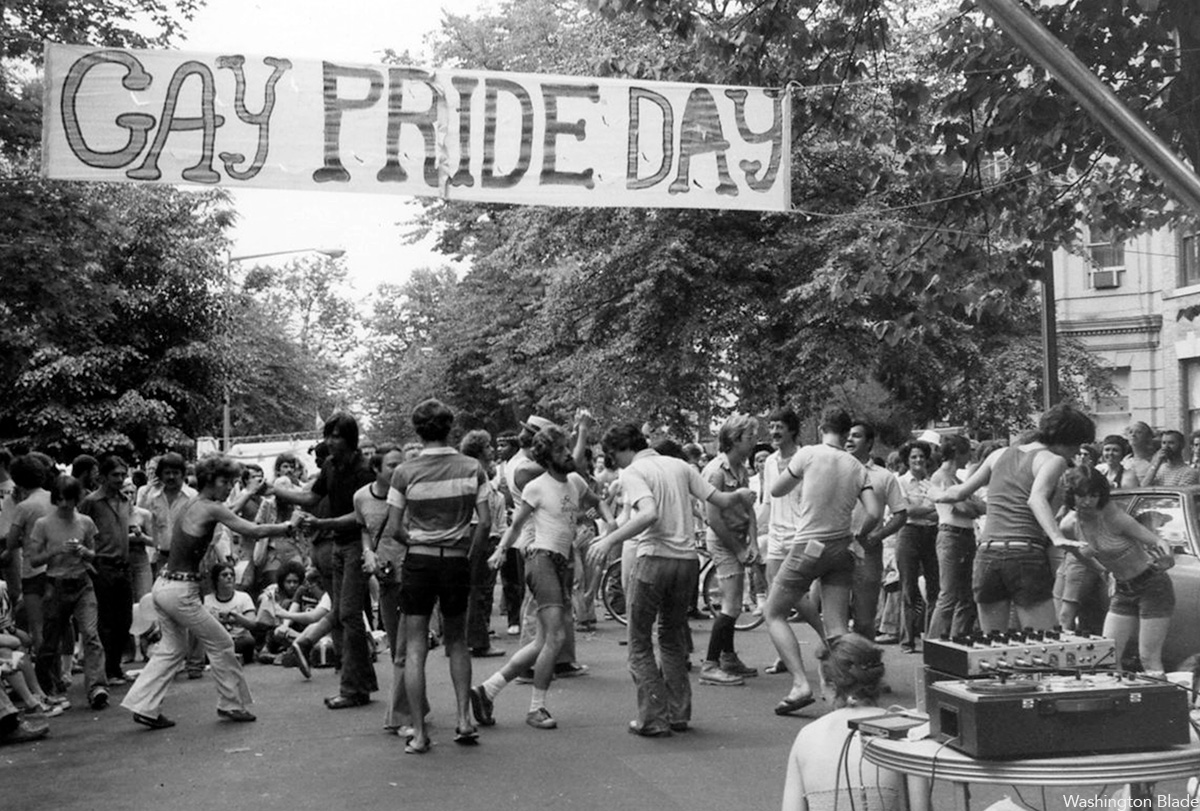
To celebrate the 50th anniversary of LGBTQ Pride in Washington, D.C., the Washington Blade team combed our archives and put together a glossy magazine showcasing five decades of celebrations in the city. Below is a sampling of images from the magazine but be sure to find a print copy starting this week.
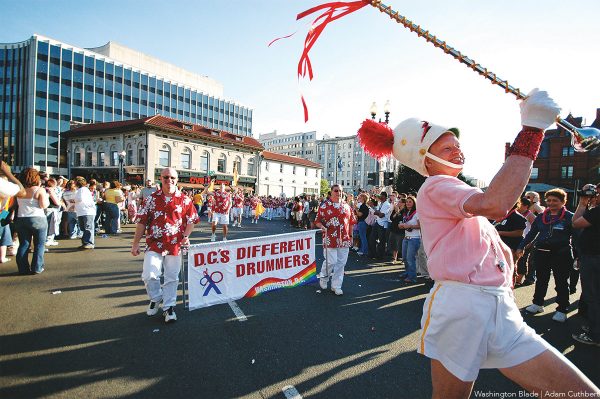
The magazine is being distributed now and is complimentary. You can find copies at LGBTQ bars and restaurants across the city. Or visit the Blade booth at the Pride festival on June 7 and 8 where we will distribute copies.
Thank you to our advertisers and sponsors, whose support has enabled us to distribute the magazine free of charge. And thanks to our dedicated team at the Blade, especially Photo Editor Michael Key, who spent many hours searching the archives for the best images, many of which are unique to the Blade and cannot be found elsewhere. And thanks to our dynamic production team of Meaghan Juba, who designed the magazine, and Phil Rockstroh who managed the process. Stephen Rutgers and Brian Pitts handled sales and marketing and staff writers Lou Chibbaro Jr., Christopher Kane, Michael K. Lavers, Joe Reberkenny along with freelancer and former Blade staffer Joey DiGuglielmo wrote the essays.

The magazine represents more than 50 years of hard work by countless reporters, editors, advertising sales reps, photographers, and other media professionals who have brought you the Washington Blade since 1969.
We hope you enjoy the magazine and keep it as a reminder of all the many ups and downs our local LGBTQ community has experienced over the past 50 years.
I hope you will consider supporting our vital mission by becoming a Blade member today. At a time when reliable, accurate LGBTQ news is more essential than ever, your contribution helps make it possible. With a monthly gift starting at just $7, you’ll ensure that the Blade remains a trusted, free resource for the community — now and for years to come. Click here to help fund LGBTQ journalism.
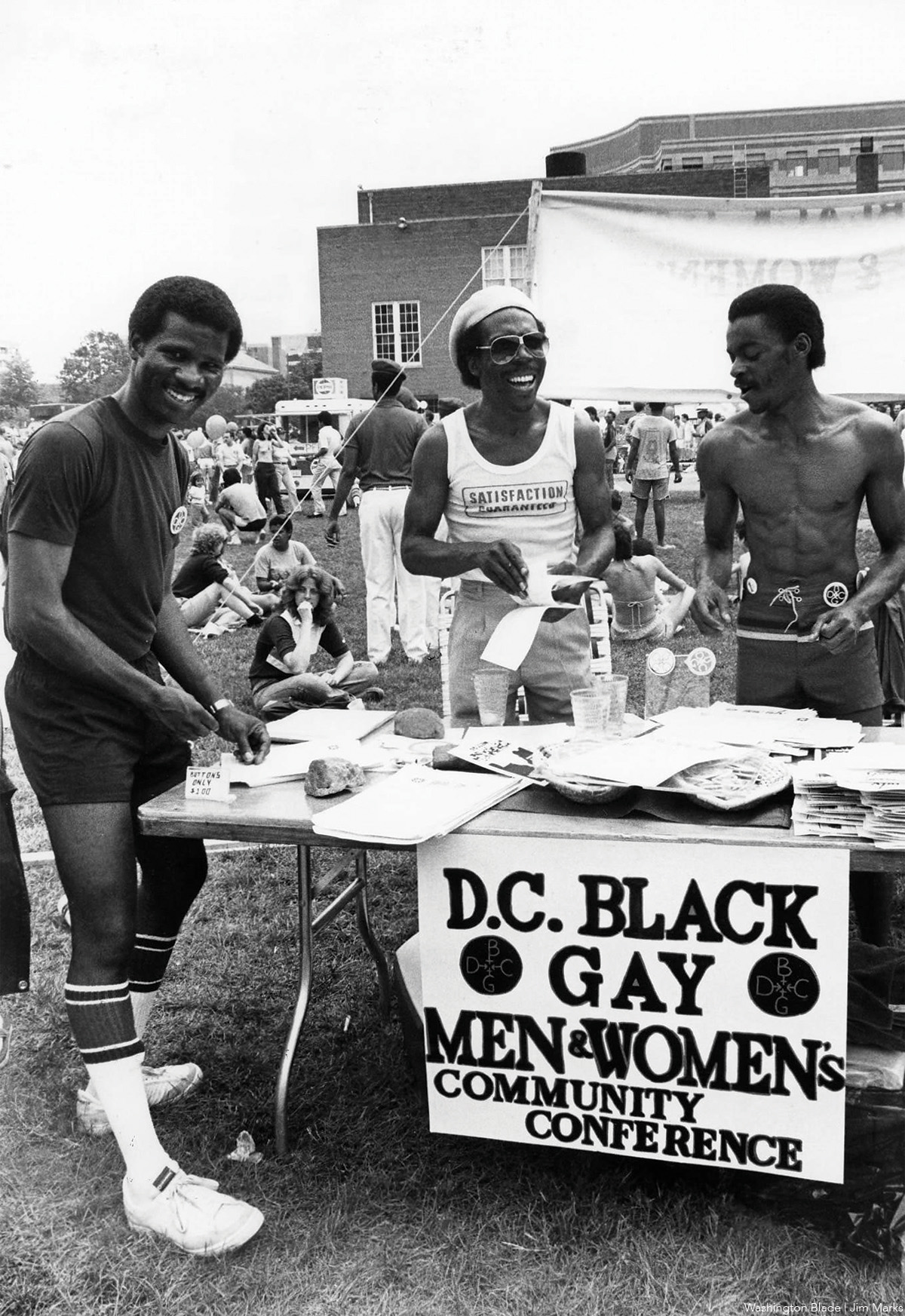
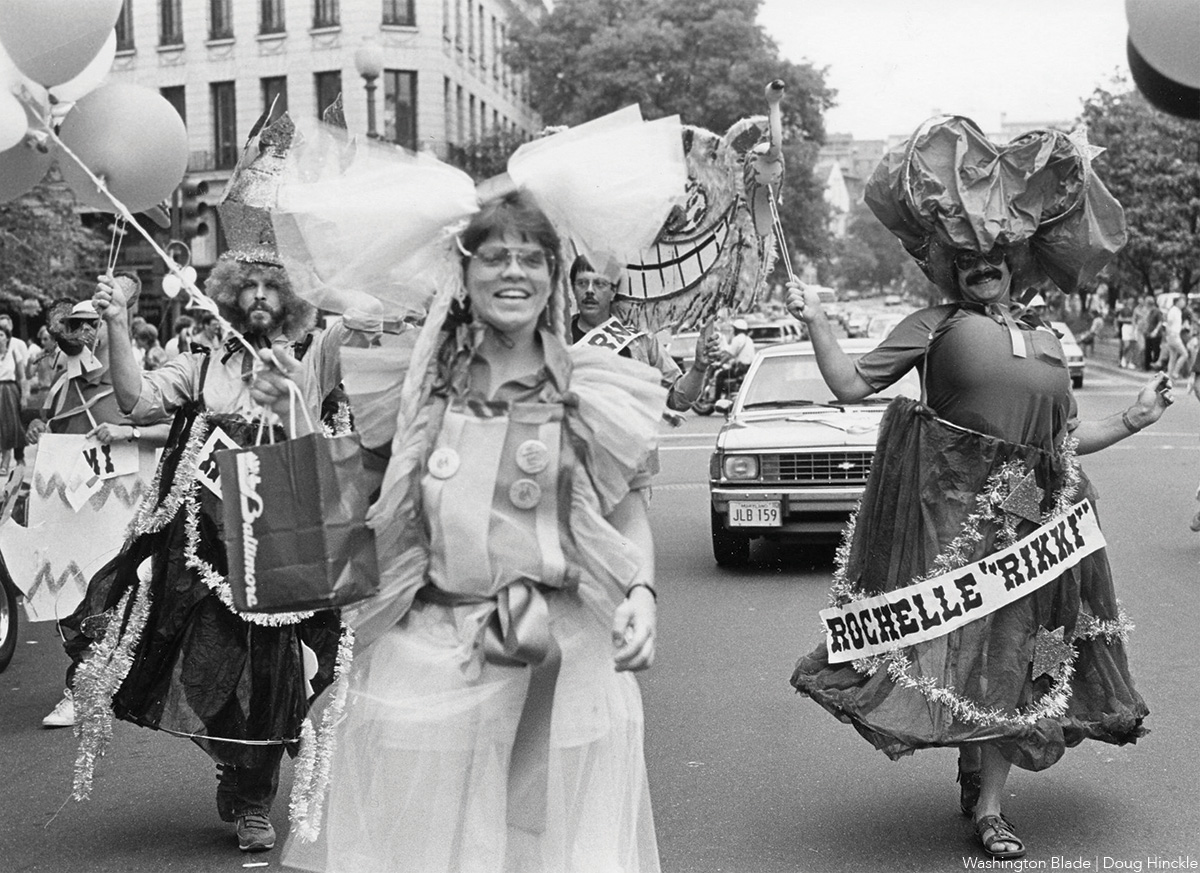

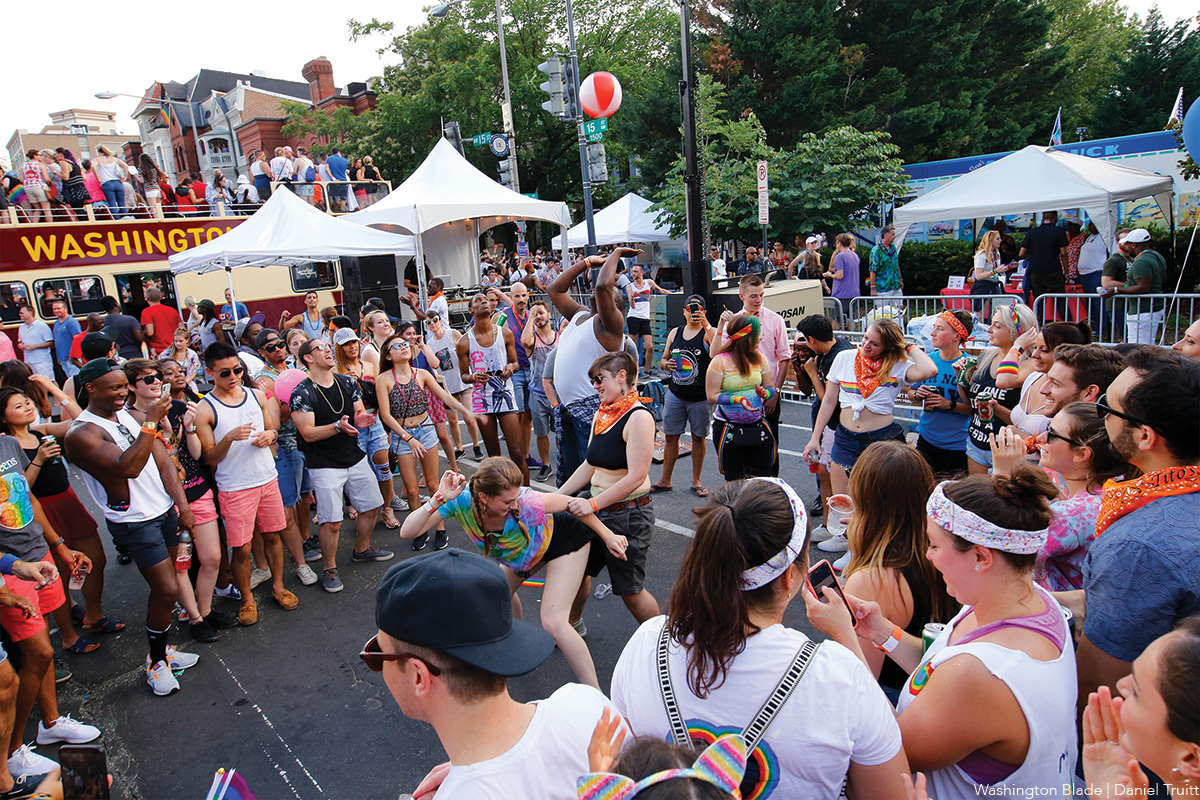
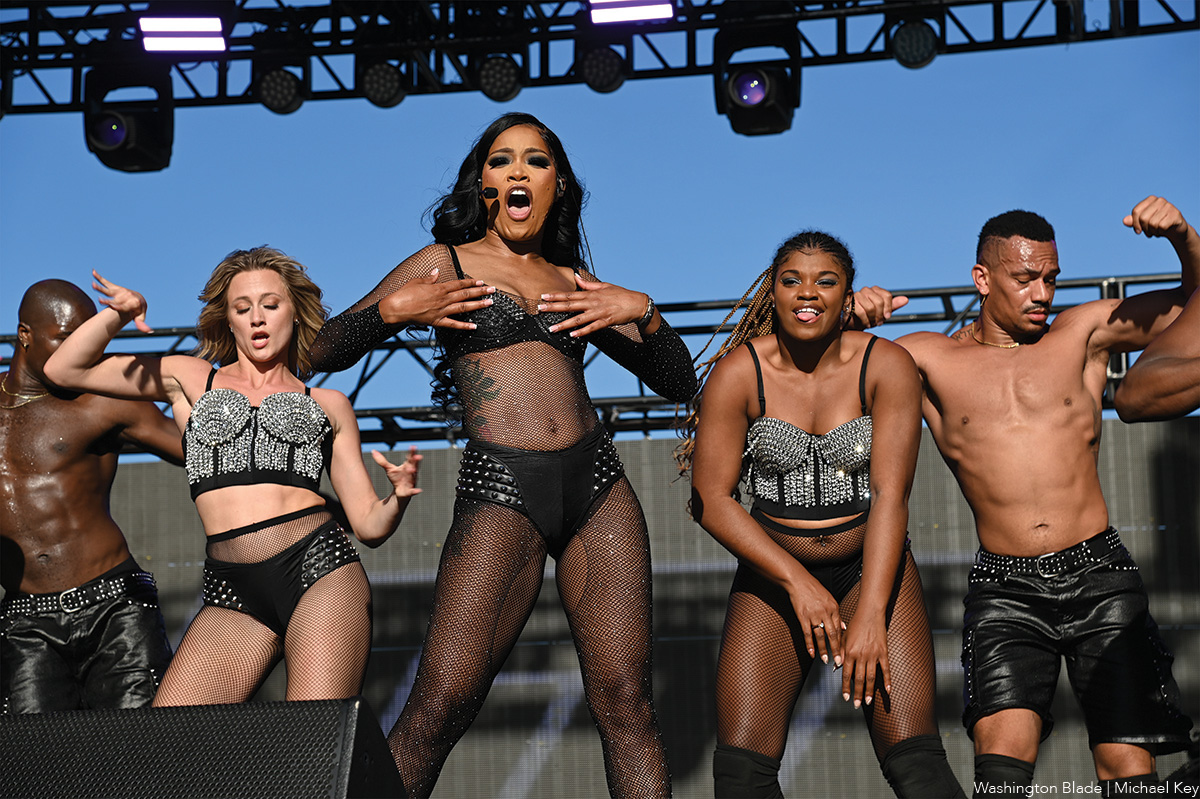
-

 U.S. Supreme Court5 days ago
U.S. Supreme Court5 days agoSupreme Court upholds ACA rule that makes PrEP, other preventative care free
-

 U.S. Supreme Court5 days ago
U.S. Supreme Court5 days agoSupreme Court rules parents must have option to opt children out of LGBTQ-specific lessons
-

 Television5 days ago
Television5 days ago‘White Lotus,’ ‘Severance,’ ‘Andor’ lead Dorian TV Awards noms
-

 Music & Concerts5 days ago
Music & Concerts5 days agoBerkshire Choral to commemorate Matthew Shepard’s life



